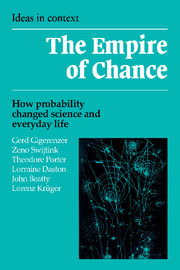Book contents
- Frontmatter
- Dedication
- Contents
- Acknowledgments
- Introduction
- 1 Classical probabilities, 1660–1840
- 2 Statistical probabilities, 1820–1900
- 3 The inference experts
- 4 Chance and life: controversies in modern biology
- 5 The probabilistic revolution in physics
- 6 Statistics of the mind
- 7 Numbers rule the world
- 8 The implications of chance
- References
- Name index
- Subject index
Introduction
Published online by Cambridge University Press: 05 December 2013
- Frontmatter
- Dedication
- Contents
- Acknowledgments
- Introduction
- 1 Classical probabilities, 1660–1840
- 2 Statistical probabilities, 1820–1900
- 3 The inference experts
- 4 Chance and life: controversies in modern biology
- 5 The probabilistic revolution in physics
- 6 Statistics of the mind
- 7 Numbers rule the world
- 8 The implications of chance
- References
- Name index
- Subject index
Summary
Fortuna, the fickle, wheel-toting goddess of chance, has never been a favorite of philosophy and the sciences. In that touchstone of medieval learning, Boethius' Consolations of Philosophy, sober Dame Philosophy warns that only when Fortuna “shows herself unstable and changeable, is she truthful,” and preaches against the very existence of chance, conceived as “an event produced by random motion and without any sequence of causes.” Dame Philosophy had illustrious allies. Despite the upheavals in science in the over two millennia separating the Athens of Aristotle from the Paris of Claude Bernard, they shared at least one article of faith: science was about causes, not chance.
Yet even as Bernard sought to banish chance and indeterminism from physiology, Fortuna already ruled a large and growing empire in the sciences. The laws of the realm were probability theory and statistics. By “taming chance,” in Ian Hacking's evocative phrase, probability and statistics had reconciled Scientia to her arch-rival Fortuna. From its beginnings in the mid-seventeenth century, probability theory spread in the eighteenth century from gambling problems to jurisprudence, data analysis, inductive inference, and insurance, and from there to sociology, to physics, to biology, and to psychology in the nineteenth, and on to agronomy, polling, medical testing, baseball, and innumerable other practical (and not so practical) matters in the twentieth. But this triumphal march was emphatically not the simple accumulation of applications by a mathematical theory.
- Type
- Chapter
- Information
- The Empire of ChanceHow Probability Changed Science and Everyday Life, pp. xiii - xviiiPublisher: Cambridge University PressPrint publication year: 1989



